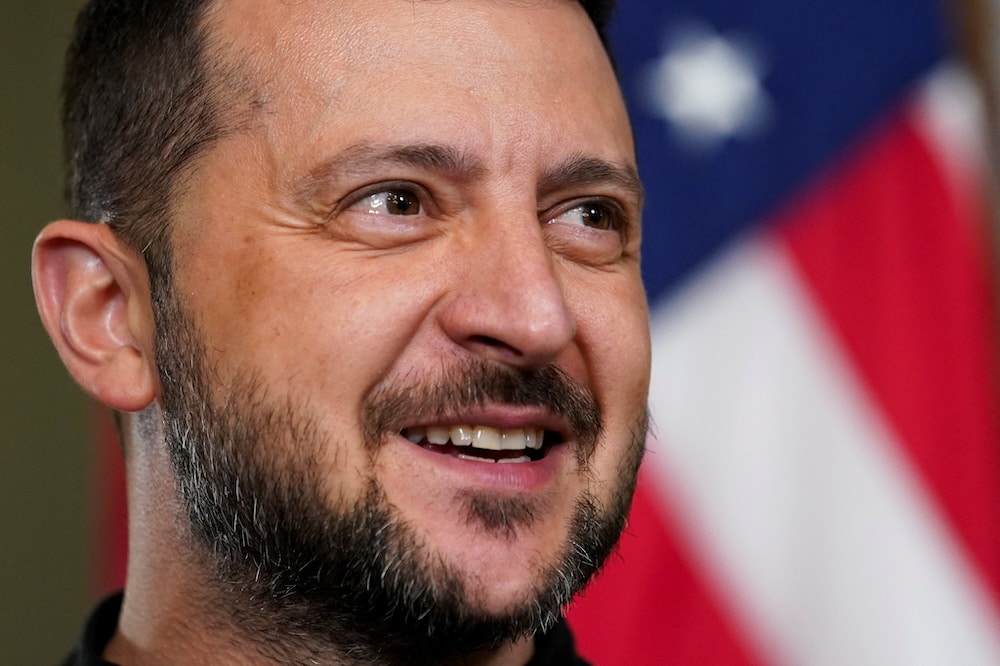WASHINGTON (OSV News) — Ukrainian President Volodymyr Zelenskyy met with President Joe Biden as well as those vying to succeed him: former President Donald Trump and Vice President Kamala Harris.
Meanwhile, the two major-party contenders for president released dueling economic plans. The Catholic author of a landmark anti-human trafficking law touted its impact in the indictment and arrest of hip-hop mogul Sean “Diddy” Combs, and a bill introduced in the Senate that would increase the federal child tax credit was praised by pro-life leaders.

Zelenskyy visits U.S., meets with Biden, Harris, Trump
Zelenskyy’s visit to the United States comes at what could be pivotal moments in both the ongoing war in his country since Russia’s full-scale invasion began in 2022 and in the American presidential election.
Biden sought to show support for Ukraine in the conflict, but rejected Kyiv’s request for permission to fire American-made missiles deeper into Russia. But he pledged more military aid and new long-range strike capabilities and other air defense capabilities.
In a separate meeting with Harris, the vice president pledged to Zelenskyy she would “ensure Ukraine prevails in this war,” and blasted Russian President Vladimir Putin, who she said “could end the war tomorrow” by halting his invasion.
Harris also criticized Ukraine-skeptical Republicans for embracing what she called “proposals of surrender” in the conflict.
“There are some in my country who would instead force Ukraine to give up large parts of its sovereign territory, who would demand that Ukraine accept neutrality and would require Ukraine to forego security relationships with other nations,” Harris said.
Trump, meanwhile, who has been critical of U.S. aid to Ukraine, said on the campaign trail that Zelenskyy was “making little nasty aspersions toward your favorite president, me.” But Trump later agreed to a meeting with him in New York, where he called the Ukrainian president a “piece of steel” and called it “an honor” to meet with him.
Zelensky told reporters he hoped the support of the United States would continue regardless of who wins the election.
“And that’s why I decided to meet with most candidates, with all of them,” he said.
Russia’s government is systematically persecuting Christian and other faith communities in occupied regions of Ukraine, according to experts who testified before U.S. lawmakers of the Helsinki Commission this past July. Russian officials in the occupied portion of Ukraine’s Zaporizhzhia region have also formally banned the Ukrainian Greek Catholic Church by written decree, as well as the Knights of Columbus and Caritas Ukraine.
Harris and Trump share dueling economic plans
Harris and Trump offered competing pitches on economic policy: Harris pledged to build a pro-business economy that helps boost the middle class and small businesses, rebuking Trump’s claim that she has advocated “communist” ideas, while Trump argued for policies that he said would “steal” manufacturing jobs that have moved overseas.
In remarks on Sept. 25 at the Economic Club of Pittsburgh in Pennsylvania, a key swing state, Harris pledged a “pragmatic” approach as president.
“As president, I will be grounded in my fundamental values of fairness, dignity and opportunity,” Harris said.
Harris also pledged down payment assistance for first-time home buyers and a strengthened child tax credit, including a $6,000 tax benefit for parents with newborns.
In his own remarks the same day in Mint Hill, North Carolina, Trump pitched a special lower tax rate for U.S. manufacturers and pledged to impose high tariffs to prompt an “exodus” of auto factory jobs from other countries.
“I’m imposing tariffs on your competition from foreign countries, all these foreign countries that have ripped us off, which stole all of your businesses and all of your jobs years ago,” Trump said.
A survey by the Pew Research Center — conducted on Aug. 26- Sept. 2, prior to the debate — found the economy was the top issue for 88% of Catholics in the presidential election, with economic concerns rating slightly higher for Hispanic Catholics than white Catholics.
Among all registered Catholic voters surveyed, 52% said they would support Trump, while 47% said they would support Harris.
But the partisan divide shifted when divided by race. White Catholics said they would support Trump 61% to 38%, while Hispanic Catholics said they would support Harris 65% to 34%.

Catholic lawmaker’s anti-trafficking law at work in Sean ‘Diddy’ Combs case
After the indictment and arrest on Sept. 16 of Sean “Diddy” Combs, the author of a law prosecutors used to bring sex trafficking and forced labor charges against the rapper and music mogul said his legislation “has proven critical in locking up criminals that abuse and traffic in women and children.”
Among other charges, Combs allegedly led a criminal enterprise abusing and exploiting women and covering up his actions, prosecutors said. Several women have also accused him of sexual assault.
At a press conference announcing the charges on Sept. 17, Damian Williams, the U.S. attorney for the Southern District of New York, credited the severe penalties provided by the Trafficking Victims Protection Act of 2000, telling reporters, “the sex trafficking conduct carries some significant penalties, and we are gratified that we were able to bring that charge.”
Rep. Chris Smith, R-N.J., the longtime Catholic lawmaker who authored that law, said in a statement issued in response, the legislation “created a new whole-of-government domestic and international strategy to combat sex and labor trafficking and established numerous new programs to protect victims, prosecute traffickers, and to the extent possible, prevent it in the first place.”
“Thousands of human traffickers have been and continue to be prosecuted and jailed pursuant to the Trafficking Victims Protection Act, including several charges brought against Sean ‘Diddy’ Combs, all of the charges brought against Jeffrey Epstein, and the infamous convictions involving the ‘Smallville’ actress Allison Mack,” Smith said.
Combs has pleaded not guilty to the charges. He also faces multiple civil suits alleging sexual misconduct.
Romney reintroduces Family Security Act
Sen. Mitt Romney, R-Utah, reintroduced the Family Security Act, legislation he argued would consolidate existing federal spending to increase the child tax credit, and include a provision for pregnant mothers.
“When the Tax Cuts and Jobs Act of 2017 expires next year, the Child Tax Credit will be cut in half — leaving federal family policies inadequate, unpredictable, and scattered across the tax code,” Romney said in a statement. “My Family Security Act solves this by generously supporting families without adding a penny to the national debt. It is my hope that this legislation will serve as a starting point during tax negotiations next year. We must renew our commitment to support families raising children, and I urge my colleagues of the next Congress to do so in a fiscally responsible manner.”
Congress allowed an expanded child tax credit to expire in 2021, and lawmakers have debated competing visions for reauthorizing the policy, but failed to come to an accord before the 2024 election. Unless they revisit the issue in 2025, the current child tax credit level will expire, falling from $2,000 to $1,000 per child.
Romney won’t be in the U.S. Senate for those negotiations, as he did not seek reelection and will leave office in early 2025.
Some pro-life leaders praised the legislation, including Jeanne Mancini, president of March for Life Action, who said in a statement the group “is grateful for Senator Romney’s effort to actively support children inside and outside the womb along with their families through the Family Security Act.”
“We at March for Life Action will continue to work alongside lawmakers to cultivate a culture of life, where both mom and baby lead lives of flourishing,” Mancini said.
The group Feminists for Life also urged pro-life advocates to call on senators to support the bill, noting in their breakdown of the bill that families can claim the credit for up to six children annually, and can choose to receive the credit in advanced monthly payments ($350 per month for a child ages 0-5 and $250 for a child ages 6-17); establishes a $2,800 tax credit — per each unborn child — for pregnant mothers that can be received in monthly payments starting at 20 weeks.
“With families struggling to put food on the table and pay the rent and utilities, these extra credits could help lift millions of children out of poverty,” the group said.
Expanding the child tax credit could be a powerful, lifesaving tool in the fight against abortion, which in the U.S. is heavily correlated with poverty and low incomes.
The abortion research firm Guttmacher Institute reported 75% of women seeking abortion were low-income, with 50% below the federal poverty line. About six out of 10 women seeking abortion were already mothers.
The top concerns reported included not being able to afford another child, losing the ability to work or continue education, or having to care for dependents or other family responsibilities.
In an article for Public Discourse, demographer and Institute for Family Studies research fellow Lyman Stone argued Romney’s “Family Security Act” had an “extremely high likelihood that it would reduce the abortion rate” since it helps “expectant parents to navigate the challenges of pregnancy with less financial worry.” He noted financial pressures factor into the reasons 70% of women give for abortion and several studies have shown “cash transfers directly reduce abortions.”







